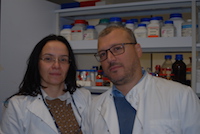Members Login

Channels
Special Offers & Promotions
New Discovery Offers Cure by Starving Cancer Cells
Scientists know that most cancer cells use glucose to fuel their uncontrolled growth and now an international team of researchers has identified a protein which if switched off could stop the disease in its tracks.
 Explained lead academic Dr Concetta Bubici from Brunel University London: “The protein PARP 14 is over-produced in virtually every human cancer but not in normal cells.
Explained lead academic Dr Concetta Bubici from Brunel University London: “The protein PARP 14 is over-produced in virtually every human cancer but not in normal cells.
“What we have discovered is that its role in cancer is to allow cells to harness glucose in a different way from healthy ones which in turn powers their rapid, uncontrolled growth while also protecting them from the normal cycle of programmed cell death.
“Almost all cells in the human body have a strictly limited life. In stimulating over-production of PARP 14, cancer cells effectively are not only turbo-charged through being able to use glucose to grow and divide which takes a lot of energy but also become immune from the natural checks and balances of the cell death cycle known as apoptosis.
Added Dr Salvatore Papa from the Institute of Hepatology London: “We discovered that too much PARP 14 effects other proteins in the body called kinases that control apoptosis.
“So if we can find a way of stopping this over production of PARP 14 we can cure cancer.”
A further benefit of such a new therapy would be to make cancer more vulnerable to existing chemotherapy which the team expect will continue to be used .
Controlling or inhibiting proteins and enzymes in the body is now an integral part of modern medicine widely used to for conditions from stomach ulcers to depression and already has an important role in preventing the recurrence of breast cancer.
But the team warn that much more research needs to be done before doctors are able to prescribe a drug which will inhibit PARP 14.
Media Partners


